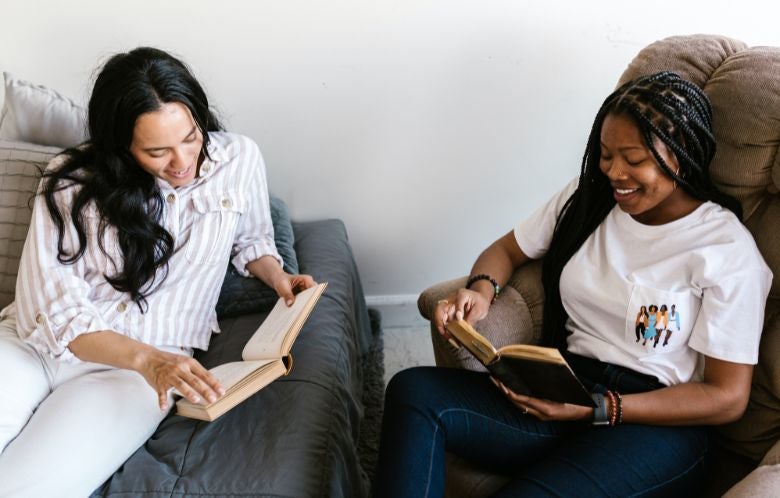I’ve always believed that I could read anything — not just because I learned how to read and also happen to love reading — but because I felt certain that if there was anything I wanted to read, I’d be able to get it. But lately, my certainty is shaken because there are some very loud voices advocating for restricting the books that are available. If you think this might be an exaggeration, read the latest report from American Library Association (ALA) showing that book challenges have more than doubled.
The loud voices are all too real, and they are getting attention from lawmakers and funders. Books are being pulled out of classrooms and libraries. Funding is being cut to those who don’t comply with the restrictions. The people who champion reading — librarians and teachers — are being attacked for just doing their jobs. We are watching a slow erosion of our ability to read freely, and most of us aren’t doing anything to stop it.
Even when we believe deeply in something, I think many of us tend towards inaction. We think the worst can’t happen (but it can). We assume someone else will do the arguing (but it’s not enough). Or we don’t think our one voice matters that much (but it does). Maybe we don’t really know what to do (keep reading for ideas!). Or, we just get busy with life (I feel you). But when we’re silent, it leaves room for others to be loud. We can’t be silent about the right to read freely; there is too much at stake. An excellent illustration of how other voices fill the silence is Claudia Johnson’s article: A Veteran of the Book-Banning Wars on the Importance of Speaking Out. Ms. Johnson’s message is simple; show up and speak up if you want to counterbalance the voices that are calling for restrictions. We need to be equally loud in opposition.
I became a librarian 20 years ago because I loved the idea of libraries. The joy of wandering the stacks, the knowledge that I could check out any book I wanted… this profession called to me. Recently I was so proud to see fellow librarian and ALA president, Tracie D. Hall, recognized in a very visible way in Time Inc’s 100 Most Influential list for her dedication to this important work of defending the right to read freely. She advocates for us, and her voice is loud on our behalf.
But it’s time for the rest of us to get loud too. It isn’t enough to let Tracie do the talking for us. We all need to show up, speak up, and amplify her voice.
Reading is transformative. This seems to scare some people into thinking that it is a bad thing. But the real story is that reading freely opens minds. Open minds embrace differences and inclusivity. Today happens to be Right to Read Day, designated by ALA as a national day of action meant to encourage us all to protect the right to read. What I love about Right to Read Day is that it is “not just a day for acknowledgment” but a day to do something. A day to show up and make your voice heard on behalf of the freedom to read freely.
But what should you do if you’re not used to speaking up? Take some baby steps, and I promise it will get easier! Here are a few suggestions to get you started:
-
Borrow (and read!) a book that has shown up on a challenged books list. Even better if you borrow it from your local library — this will make sure your interest is tracked for those who make decisions about what to collect. ALA has a list of frequently challenged books.
-
Read up on stories written by people from cultures that have tried to restrict reading. I'm currently reading the memoir Reading Lolita in Tehran by Afar Nafisi. Another classic is Fahrenheit 451. Try searching in NoveList for books with the subject “banned books” and you’ll find lots more ideas.
-
Show up at board meetings where book bans or challenges are being discussed. I recommend following @FReadomFighters on Twitter or the Instagram hashtag #FreePeopleReadFreely to stay informed.
-
Write letters to elected officials against book challenges and about the importance of a community that reads freely. EveryLibrary compiles a helpful list of legislation of concern. And here is a great letter template to use.
-
Speak to your school district leaders about the fact that you WANT kids to be exposed to different ideas so they can learn to think for themselves. Here is a great guide about what to say when speaking to school leaders.
-
If you’re in a position to choose books for a library or classroom, or bookstore, be inclusive in your choices. Create a display featuring challenged books that helps to educate your community. Here is a lovely flyer you could download and display.
-
Share this information about what’s happening with your network of friends, parents, etc. Use your voice to inspire even more voices.
I’m proud to work with a team of people at NoveList who believe deeply in the right to read. The products we build support libraries and readers as they choose what to read next. We do this work because we understand that reading has the power to change lives, and we embrace that change. Reading can open up minds to new ideas, give inspiration to become better, and offer comfort when needed. Join us in speaking up and getting loud so that none of us lose the freedom to read freely.
Danielle Borasky is the Vice President of NoveList. She is currently reading Reading Lolita in Tehran by Afar Nafisi.



